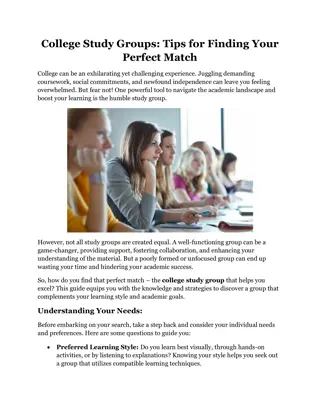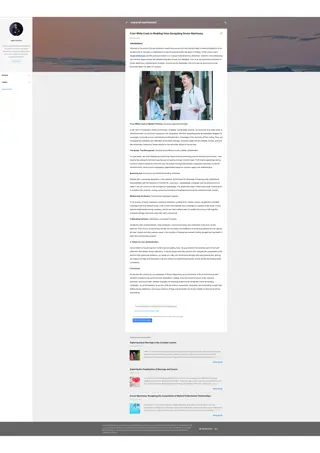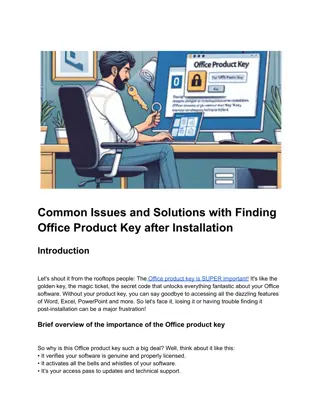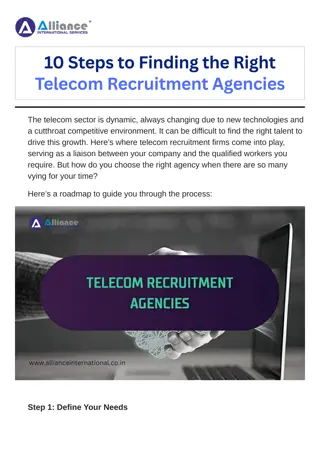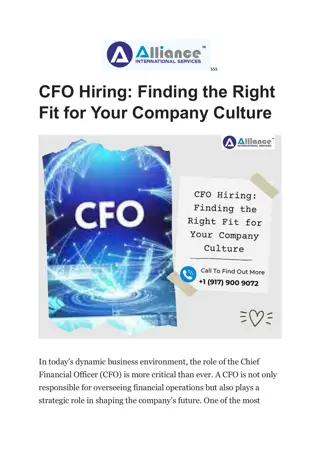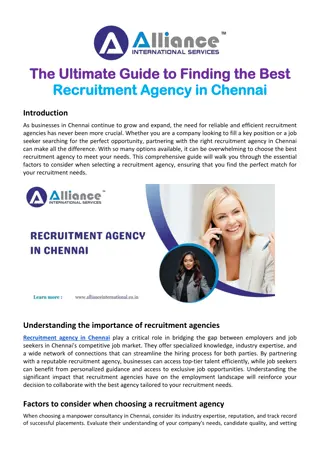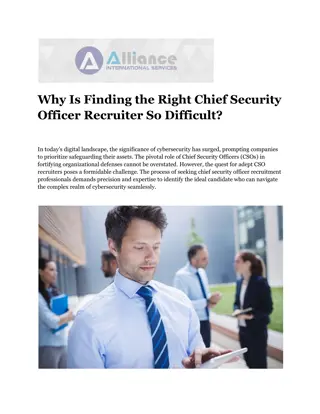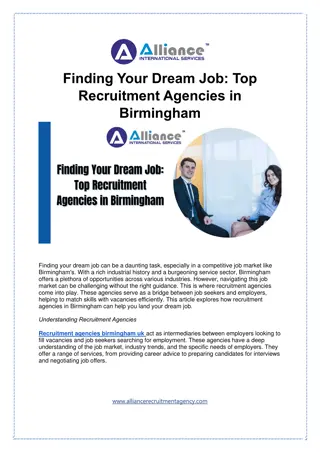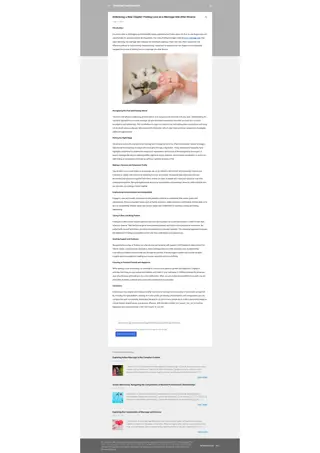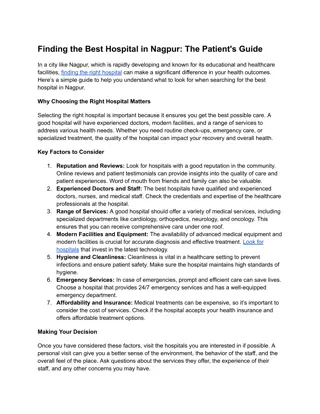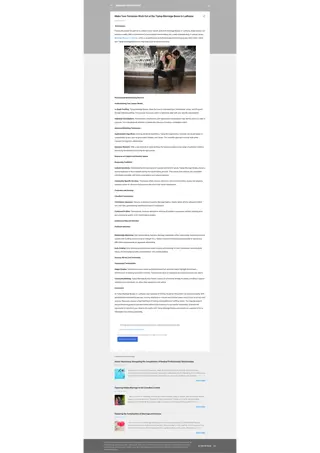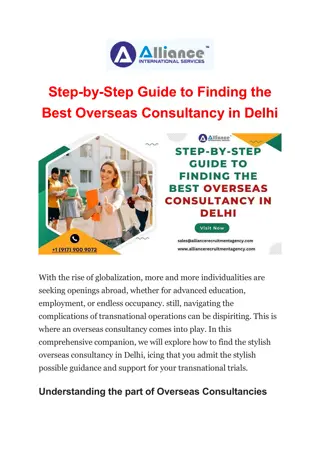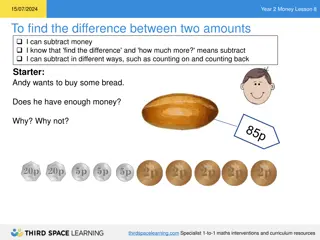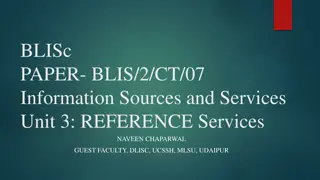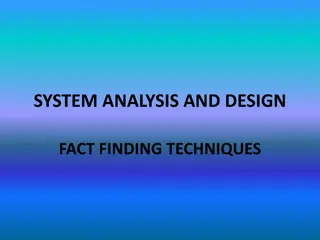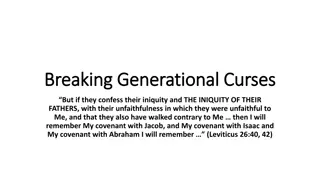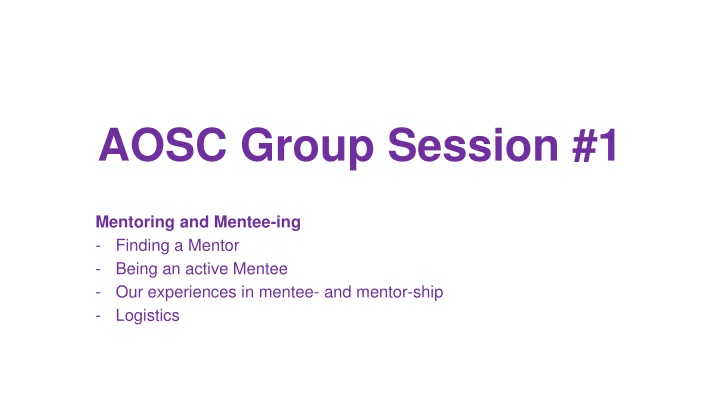
Effective Mentoring and Mentee-ing in Research Environments
Learn about the collaborative nature of mentoring, key attributes of effective research mentoring, and what makes a good mentor in research environments. Discover the roles of mentors, from advisors to sponsors, and how to be an active and engaged mentee.
Download Presentation

Please find below an Image/Link to download the presentation.
The content on the website is provided AS IS for your information and personal use only. It may not be sold, licensed, or shared on other websites without obtaining consent from the author. If you encounter any issues during the download, it is possible that the publisher has removed the file from their server.
You are allowed to download the files provided on this website for personal or commercial use, subject to the condition that they are used lawfully. All files are the property of their respective owners.
The content on the website is provided AS IS for your information and personal use only. It may not be sold, licensed, or shared on other websites without obtaining consent from the author.
E N D
Presentation Transcript
AOSC Group Session #1 Mentoring and Mentee-ing - Finding a Mentor - Being an active Mentee - Our experiences in mentee- and mentor-ship - Logistics
Introductions Who you are! Where you re from What you re interested in (what gets you excited): Clinically Scholarly: Broad definition of research. This can be anything ranging from mechanistic work in experimental models to community-based implementation work to policy and advocacy research!
Mentoring is a collaborative learning relationship that proceeds through purposeful stages over time and has the primary goal of helping mentees acquire the essential competencies needed for success in their chosen career. Pfund C. et al. (2016) AIDS and Behavior, Suppl 2: 238-48; McGee, R.M. et al. (2016), AIDS and Behavior, Suppl 2:231-237.
5 key attributes of effective research mentoring Research/scholarship Interpersonal Psychosocial and career Culturally responsive Sponsorship Pfund, C., Byars-Winston, A., Branchaw, J., Hurtado, S., and Eagan, K., Defining Attributes and Metrics of Effective Research Mentoring Relationships, AIDS Behavior, 2016. 20:S238 S248
Mentoring relationships are complex because we expect many different roles in one Mentor: passing on advice, knowledge, experience Supervisor: overseeing tasks, research progress, medium term and day to day goals Coach: supporting and enabling learning and development Sponsor: proactively advocating for success Acad Med. 2016 August; 91(8): 1128 1135. doi:10.1097/ACM.0000000000001026. Also see Diversity and Inclusion at SLAC (https://inclusion.slac.stanford.edu/) ; and Montgomery, B. L., Dodson, J. E., & Johnson, S. M. (2014). Guiding the Way: Mentoring Graduate Students and Junior Faculty for Sustainable Academic Careers. SAGE Open.
What makes a good mentor? Accessible and responsive Do they answer their emails? Do they cancel meetings with you frequently? Who will be the person you work with most closely on the research team? Is it the faculty member, research coordinator, or fellow? Ideally, your mentor has worked with students previously and understands your time limitations
What should you expect from a mentor? Helps you to define your learning and research goals and review and revise them as needed Meets regularly, one-on-one, to discuss your progress to and challenges and provide timely feedback Listens to you and to your ideas Supports opportunities for growth in the areas such as through your training or presentation opportunities Helps you build your network Integrate into the team Introduce you to other researchers in the area Acknowledge your contribution to the research, through authorship on abstracts or publications (ore on that later)
Timeline Nov. 11 M2 poster session (M1 s attend!) Rolling submission: Evidence of first author paper submission (AOSC or not), or thesis. Latest: Winter M4 March 6: Submit formal research proposal Find a mentor Summer Research Block/SRSP Develop a research question with mentor M1 M2 M3 M4 If may be interested in RISE: Email Liza.Rivnay@northwestern.edu to set up an introductory meeting with Dr. Feinstein. NO NEED TO BE NERVOUS NOT AN INTERVIEW! Purpose is to explore your interests and position you to succeed with finding a mentor who is potentially able to take on a student for an extra year.
Contacting potential mentors via email Briefly introduce yourself & the purpose for contacting them (ie. AOSC research project) Note why you are interested in their specific research Look at their faculty profile, current work, recent publications. Doing your homework here will help the mentor know you re serious! State your intention (work on an AOSC project) State how this matches with your research interests/enthusiasm for research Include your contact information (email, phone, etc.) Ask if they are willing to meet or who they may recommend Ask for their availability in the next X weeks (do not give them yours) Add your CV (2-4 pages, highlight skills relevant to research) Keep it formal If no response in 2 weeks, resend . If there is still no response, consider other mentors Close the loop. If you don t choose a mentor you ve contacted, let them know. Example: Thank you for taking the time to meet. I enjoyed our discussion and learning more about your program. After meeting with several faculty members, I have decided to work with ____ on my AOSC project, and am grateful for your time and effort in discussing research opportunities with me!
Example of email to send out to potential mentors Dear Dr. ______. I am a first year medical student at the Northwestern University Feinberg School of Medicine who will be performing research in the Area of Scholarly Concentration (AOSC) program (https://www.feinberg.northwestern.edu/md-education/curriculum/components/learning-strategies/student- research/index.html). This is a 4 year research program for medical students, performed under the supervision of a Northwestern faculty mentor. I am interested in your work including (SOME DETAILS) My background (IF RELEVANT) I wish to inquire whether you would be willing to meet with me to discuss potential research opportunities with your group. I look forward to your response and potential next steps. Sincerely,
What do you ask the mentor when you meet The research program Areas of current and upcoming work New areas of work What projects night be available/feasible The personality/mentoring style/goals of the mentor How that matches your personality and goals (the roles/attributes) Mentoring and communication How accessible they are The research environment Who is on the team With whom would you be working? Resources to fill in knowledge gaps Previous mentees and experience with AOSC
Finding a Mentor Resources (https://www.feinberg.northwestern.edu/md-education/curriculum/components/learning-strategies/student-research/current-mentor-list.html) Mentor must be a Northwestern or Northwestern-affiliated faculty (Feinberg, NU, Kellogg, SRALab, Lurie s, Pritzker) Google AOSC Northwestern Finding a mentor Search the mentor directory at bottom of the page by name/key word Contact a department liaison on top of the page these are faculty members who can connect you to others in their department Talk to your AOSC small group leader they can recommend faculty members as well! Reach out to fellow students You can see projects your M2 students are working on by going to the Search M2 Student Posters from the 2021 AOSC Poster Session tab and searching by keyword Contact Liza Rivnay and/or Matt Feinstein we can put you in touch with students who have worked with various faculty or faculty based on your area of interest
Bonus (covered in future lectures): How do you come up with a good research topic? Explore some area that interests you and that you will enjoy learning more about Do not worry about the specific topic you can always do additional research later in your training in a specialty area You will not be penalized for doing research in one area then go into another field the worst that will happen is that you need to do additional research in an area that you are now passionate about
What is the question answering? Controversies in the field? Knowledge gaps? Further exploration? Improvement? Impact of contextual factors on implementation Improve or impact beyond prior study? Understanding success or challenge in implementation and/or sustainability Formative questions
What is a good research question? Typically hypothesis driven Question whose answer provides generalizable knowledge Important and either not studied before or needs validation Addressed through rigorous application of scientific methods Feasible to answer
What makes a good AOSC project? The topic interests you Even if you are not sure you going into that area You develop focused, specific, and feasible research question that is designed to be answered There is a role for you on the project that fits the amount of time you have and when you are available Mentorship for new skills if necessary (i.e. programming or a lab technique) It is realistic for a student. Things to consider Are you adding on to an existing IRB? Or do you have to write your own? Are the data already collected or reasonable for you to collect? Primary data collection is possible, but more challenging than a chart review A GOOD MENTOR!!
Final Tips on Research Question/Topic Your research questions should pass the so what test Keep it Specific and narrow Your question leads to a hypothesis A well stated question deserves an answer
Next Steps and Questions Go to website Meet with me individually! Find a mentor Attend M2 AOSC Poster session PLEASE put your first and last name on any file you submit!
Workshop Each group leader talks about their experience with mentorship (as a mentor/mentee or both!) Each student asks a mentoring-related question Goal is a lively discussion and for students to leave confident with next steps in this process


